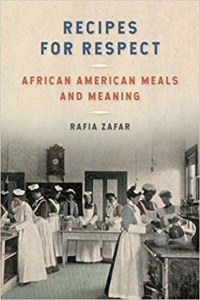Seventy-Five Years Ago, the Military’s Only All-Black Female Band Battled the War Department and Won
The women of the 404th Armed Service Forces band raised morale and funds for the military, but they had to fight discrimination to do so
Photo: The 404th AFS Band pictured in Fort Des Moines (Women’s Army Corps and WAC African American Band scrapbook from Fort Des Moines, David M. Rubenstein Rare Book & Manuscript Library, Duke University)
(Smithsonian) An estimated crowd of 100,000 people clogged the intersections in Chicago’s central business district in May of 1945 for a war bond rally, one of several marking the War Department drive that week. Police had traffic stopped for blocks approaching the stage at State and Madison Streets, and reporters noted sales clerks and customers hanging out of store windows to catch a glimpse of any famous performers or war heroes who might arrive.
Former prisoners of war appeared on stage, and the famed flag-raisers of Iwo Jima pushed war bonds to finance the war in the Pacific as a 28-member military band played patriotic music. That group, the women of the 404th Armed Service Forces (ASF) band, were the only all-black female band in U.S. military history.
During the war, all-women military bands rallied hearts—and raised millions in war bonds. The musicians numbered among the Army’s first female personnel, a distinction that branded them as pioneers to some and prostitutes to others. Each company endured societal bias, but only one, the 404th, had to battle racial stigma as well. Seventy-five years ago this year, the 28 musicians forced the War Department’s hand in a victory for civil rights. (more)
Literature
“Recipes for Respect: African American Meals and Meaning”
Food studies, once trendy, has settled into the public arena. In the academy, scholarship on food and literary culture constitutes a growing river within literary and cultural studies, but writing on African American food and dining remains a tributary. Recipes for Respect bridges this gap, illuminating the role of foodways in African American culture as well as the contributions of Black cooks and chefs to what has been considered the mainstream.
Beginning in the early nineteenth century and continuing nearly to the present day, African Americans have often been stereotyped as illiterate kitchen geniuses. Rafia Zafar addresses this error, highlighting the long history of accomplished African Americans within our culinary traditions, as well as the literary and entrepreneurial strategies for civil rights and respectability woven into the written records of dining, cooking, and serving. Whether revealed in cookbooks or fiction, memoirs or hotel-keeping manuals, agricultural extension bulletins or library collections, foodways knowledge sustained Black strategies for self-reliance and dignity, the preservation of historical memory, and civil rights and social mobility.
If, to follow Mary Douglas’s dictum, food is a field of action―that is, a venue for social intimacy, exchange, or aggression―African American writing about foodways constitutes an underappreciated critique of the racialized social and intellectual spaces of the United States. (more)
Announcement!
TAMU Scholar Launching a New Version of the Black Settlement Online Mapping Tool, ATLAS 2.0
The Texas Freedom Colonies Project invites you to participate in a statewide study & to test a new mapping application!
 ATLAS 2.0 GOES LIVE MONDAY, APRIL 1st, 2019, 10 am
ATLAS 2.0 GOES LIVE MONDAY, APRIL 1st, 2019, 10 am
Dr. Andrea Roberts (The Texas Freedom Colonies Project Founder) and her research team, are excited to announce the launch of a new crowdsourcing project: The Texas Freedom Colonies Atlas along with a survey of settlement locations, preservation activities, and culture.
Since 2014, The Texas Freedom Colonies Project has documented Black settlement heritage and grassroots preservation practice among descendants of these historic communities.
Though there are some 557 known place names, they have yet to be fully verified and their locations formally mapped. The team has located and verified the existence of 357 settlements. In Atlas Beta 1.0, you shared your stories of 11 new freedom colonies and helped us to put them on the map! (more)
Colorful Quilts Crafted from African Fabrics Tell Stories of Artist’s Ancestral Homeland
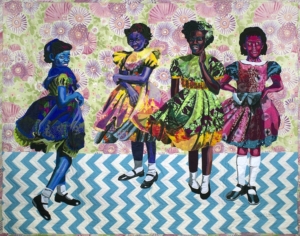
“Four Little Girls, September 15, 1963” (cotton, silk and lace, 2018, 61 x 78 x inches | 155 x 197 x cm)
(Mymodernmet.com) Brooklyn-based artist Bisa Butler has a fascinating relationship with fabric. Using fibers derived from Africa, her “ancestral homeland and the cradle of civilization,” Butler crafts kaleidoscopic quilts that tell stories through textiles.
Each of Butler’s contemporary quilts features expressive portraits of everyday people. Using materials that range from vintage lace and satin to hand-painted mud cloth, Butler pieces together exquisite studies that honor black children, adults, and families that have been overlooked by history. “My portraits,” she explains, “tell stories that may have been forgotten over time.”
Though the figures themselves are realistically rendered (Butler works from black and white photographs), the color palettes are fabricated from the artist’s imagination. This avant-garde approach is particularly striking in Butler’s treatment of black skin, which she reinterprets as eye-catching, jewel-toned mosaics.
Both her symbolic choice of fabric and her distinctive use of color characterize Butler’s body of work, which has evolved from mixed-media paintings to her signature storytelling quilts. In each work of fiber art, the artist’s careful consideration of the craft is evident, culminating in pieces that are as thoughtful as they are thought-provoking.
“My stories,” she explains, “are told in the fabrics that I choose, the textures I combine, and the colors that create a whole new composition.” (more)
TIPHC Bookshelf
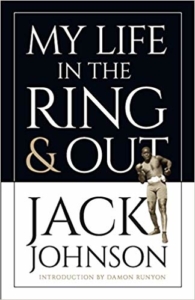 Published scholarship on black history in Texas is growing and we’d like to share with you some suggested readings, both current and past, from some of the preeminent history scholars in Texas and beyond. We invite you to take a look at our bookshelf page – including a featured selection – and check back as the list grows. A different selection will be featured each week. We welcome suggestions and reviews. This week, we offer, “My Life in the Ring & Out,” by Jack Johnson.
Published scholarship on black history in Texas is growing and we’d like to share with you some suggested readings, both current and past, from some of the preeminent history scholars in Texas and beyond. We invite you to take a look at our bookshelf page – including a featured selection – and check back as the list grows. A different selection will be featured each week. We welcome suggestions and reviews. This week, we offer, “My Life in the Ring & Out,” by Jack Johnson.
The first African American to win the world heavyweight championship, Jack Johnson (1878–1946) was the preeminent American sports personality of his era. Holder of the title from 1908 to 1915, Johnson continued to box professionally until he was in his 60s. His 1910 victory over the formerly undefeated champion James J. Jeffries in “The Fight of the Century” triggered race riots across the country, and racial bias fueled the clamor for his defeat by a “Great White Hope.” Johnson was a cultural lightning rod whose professional success and lavish lifestyle attracted both admiration and envy. In this witty and sophisticated memoir, he recounts without bitterness the prejudice, controversies, and scandals that dogged his public and private lives.
Johnson was well known for his exploits beyond the boxing world, and he offers vivid accounts of his international adventures as a bullfighter, race car driver, cabaret entertainer, and spy. His outrageous feats include rescuing a passenger train from murderous bandits in Mexico, chasing a kangaroo across the Australian outback, walking away from five fiery car crashes, and surviving revolutions in Spain, Brazil, Cuba, and elsewhere. The only edition of Johnson’s autobiography currently in print, this volume features 16 full-page illustrations and an introductory article by Damon Runyon.
This Week in Texas Black History
Mar. 31
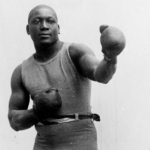 On this date in 1878, boxer John Arthur “Jack” Johnson was born in Galveston. Johnson would become the first African American to win the world heavyweight title in 1908 when he defeated Tommy Burns in Sydney, Australia via decision in a 14-round bout. In 113 fights, Johnson lost only eight and is considered one of boxing’s all-time greats. Former champion Jim Jeffries came out of retirement to challenge the black champion and was billed as “The Great White Hope” when they met on July 4, 1910, in Reno, Nevada. In what was called, “The Fight of the Century,” Johnson soundly beat Jeffries. In 1990, Johnson was inducted into the International Boxing Hall of Fame.
On this date in 1878, boxer John Arthur “Jack” Johnson was born in Galveston. Johnson would become the first African American to win the world heavyweight title in 1908 when he defeated Tommy Burns in Sydney, Australia via decision in a 14-round bout. In 113 fights, Johnson lost only eight and is considered one of boxing’s all-time greats. Former champion Jim Jeffries came out of retirement to challenge the black champion and was billed as “The Great White Hope” when they met on July 4, 1910, in Reno, Nevada. In what was called, “The Fight of the Century,” Johnson soundly beat Jeffries. In 1990, Johnson was inducted into the International Boxing Hall of Fame.
Apr. 2
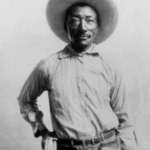 On this date in 1932, Bill Pickett, the cowboy who invented the technique of “bulldogging” steers, passed away after being kicked in the head by a horse. On his radio show, Pickett’s friend Will Rogers announced the funeral at the 101 Ranch, near Ponca City, Okla., commenting: “Bill Pickett never had an enemy, even the steers wouldn’t hurt old Bill.” Known as the “Dusky Demon,” Pickett was a native of Taylor, northeast of Austin. In 1971, he became the first black man elected to the National Cowboy Hall of Fame and Western Heritage Center in Oklahoma. In 1993, the U.S. Postal Service honored him as part of its Legends of the West series of stamps.
On this date in 1932, Bill Pickett, the cowboy who invented the technique of “bulldogging” steers, passed away after being kicked in the head by a horse. On his radio show, Pickett’s friend Will Rogers announced the funeral at the 101 Ranch, near Ponca City, Okla., commenting: “Bill Pickett never had an enemy, even the steers wouldn’t hurt old Bill.” Known as the “Dusky Demon,” Pickett was a native of Taylor, northeast of Austin. In 1971, he became the first black man elected to the National Cowboy Hall of Fame and Western Heritage Center in Oklahoma. In 1993, the U.S. Postal Service honored him as part of its Legends of the West series of stamps.
Apr. 3
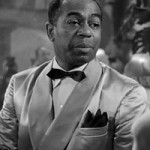 In 1886, musician Arthur “Dooley” Wilson was born on this day in Tyler. Wilson is most notably known for his role as “Sam,” the piano player in the Humphrey Bogart film, “Cassablanca,” and the target of the famous line, “Play it again, Sam,” in reference to the song, “As Time Goes By.” Ironically, Wilson was actually a drummer and couldn’t play piano. In the film, he mimicked the hand movements of an off-screen pianist. Wilson also appeared on Broadway, including the play, “Cabin in the Sky.”
In 1886, musician Arthur “Dooley” Wilson was born on this day in Tyler. Wilson is most notably known for his role as “Sam,” the piano player in the Humphrey Bogart film, “Cassablanca,” and the target of the famous line, “Play it again, Sam,” in reference to the song, “As Time Goes By.” Ironically, Wilson was actually a drummer and couldn’t play piano. In the film, he mimicked the hand movements of an off-screen pianist. Wilson also appeared on Broadway, including the play, “Cabin in the Sky.”
Apr. 3
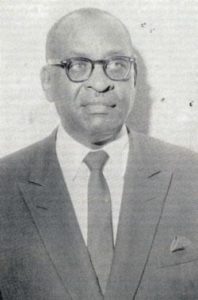 In 1944, on this day, the U.S. Supreme Court rules in Smith v. Allwright that Texas’ “White primaries” could not exclude black voters. Civil Rights activist Dr. Lonnie Smith, a dentist, had attempted to vote in the 1940 Democratic Primary but was denied a ballot at his Houston precinct because voting was open only to whites. With help from the NAACP, Smith filed a suit that reached the U.S. Supreme Court which ruled in his favor, opening primary voting to all eligible Texans.
In 1944, on this day, the U.S. Supreme Court rules in Smith v. Allwright that Texas’ “White primaries” could not exclude black voters. Civil Rights activist Dr. Lonnie Smith, a dentist, had attempted to vote in the 1940 Democratic Primary but was denied a ballot at his Houston precinct because voting was open only to whites. With help from the NAACP, Smith filed a suit that reached the U.S. Supreme Court which ruled in his favor, opening primary voting to all eligible Texans.
Apr. 4
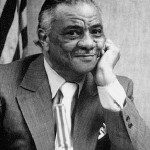 On this day in 1974, Oscar DuConge (pronounced “dew-con-jay”) was elected Waco’s first African American mayor. Born in Pass Christian, Miss., the ninth of 14 children, DuConge grew up in New Orleans and graduated from Xavier University in 1931 with a degree in sociology. He moved to Waco in September 1948 following World War II and serving in the Army. He rose to political prominence when he was elected to the Waco City Council in 1972.
On this day in 1974, Oscar DuConge (pronounced “dew-con-jay”) was elected Waco’s first African American mayor. Born in Pass Christian, Miss., the ninth of 14 children, DuConge grew up in New Orleans and graduated from Xavier University in 1931 with a degree in sociology. He moved to Waco in September 1948 following World War II and serving in the Army. He rose to political prominence when he was elected to the Waco City Council in 1972.
Apr. 4
 Paul Quinn College was founded by a small group of African Methodist Episcopal preachers in Austin on this day in 1872. The school was relocated to Waco in 1877 and then to Dallas in 1990. The school is the oldest liberal arts college for African Americans in Texas and was named after William Paul Quinn who was A.M.E. Bishop of the Western States.
Paul Quinn College was founded by a small group of African Methodist Episcopal preachers in Austin on this day in 1872. The school was relocated to Waco in 1877 and then to Dallas in 1990. The school is the oldest liberal arts college for African Americans in Texas and was named after William Paul Quinn who was A.M.E. Bishop of the Western States.
Apr. 5
 Six weeks before the U.S. Supreme Court decision in Brown v. Board of Education, Archbishop Robert Lucey announced on this day in 1954 that all of San Antonio’s parochial schools and the city’s two Catholic colleges would be integrated.
Six weeks before the U.S. Supreme Court decision in Brown v. Board of Education, Archbishop Robert Lucey announced on this day in 1954 that all of San Antonio’s parochial schools and the city’s two Catholic colleges would be integrated.
Apr. 6
 Jazz pianist and black activist Horace Tapscott was born this day in Houston in 1934. By age six he had become a competent pianist. His family moved to Los Angeles in 1943 and Tapscott began his career and would play with Lionel Hampton though primarily as a trombonist, and would be a member of Motown Records’ West Coast band, backing such groups as the Supremes. Tapscott founded the Pan Afrikan Peoples Arkestra, also known as the Ark, a collective group dedicated to preserving and developing African-American musical traditions and promoting cultural and musical education. It also distributed free food to families in Watts and made available meeting space for black radicals such as Stokely Carmichael and H. Rap Brown. Tapscott released fourteen albums.
Jazz pianist and black activist Horace Tapscott was born this day in Houston in 1934. By age six he had become a competent pianist. His family moved to Los Angeles in 1943 and Tapscott began his career and would play with Lionel Hampton though primarily as a trombonist, and would be a member of Motown Records’ West Coast band, backing such groups as the Supremes. Tapscott founded the Pan Afrikan Peoples Arkestra, also known as the Ark, a collective group dedicated to preserving and developing African-American musical traditions and promoting cultural and musical education. It also distributed free food to families in Watts and made available meeting space for black radicals such as Stokely Carmichael and H. Rap Brown. Tapscott released fourteen albums.
Blog: Ron Goodwin, Ph.D., author, PVAMU history professor
Ron Goodwin is an assistant professor of history at Prairie View A&M University. Even though he was a military “brat,” he still considers San Antonio home. Like his father and brother, Ron joined the U.S. Air Force and while enlisted received his undergraduate degree from Texas Lutheran University in Seguin, Texas. After his honorable discharge, he completed graduate degrees from Texas Southern University. Goodwin’s book, Blacks in Houston, is a pictorial history of Houston’s black community. His most recent book, Remembering the Days of Sorrow, examines the institution of slavery in Texas from the perspective of the New Deal’s Slave Narratives.
Recent Posts
The Everlasting Light
Ye are the light of the world. A city that is set on an hill cannot be hid. Neither do men light a candle, and put it under a bushel, but on a candlestick; and it givith light unto all that are in the house. Let your light so shine before men, that they may see your good works, and glorify your Father which is in heaven. — Matthew 5: 14-16
This is the month set aside to honor…(more)
The Return of the Silent Majority
Fifty years ago, in January 1969, Richard Nixon was sworn in as the thirty-seventh president of the United States. His legacy as President was marred by the Watergate investigations and his eventual resignation from office which overshadowed the way in which he won the office. His central campaign rhetoric was designed to garner support from white Southerners (otherwise known in history as the “Silent Majority”) whose racial beliefs leaned heavily towards the support of white…(more)
Submissions wanted
Historians, scholars, students, lend us your…writings. Help us produce the most comprehensive documentation ever undertaken for the African American experience in Texas. We encourage you to contribute items about people, places, events, issues, politics/legislation, sports, entertainment, religion, etc., as general entries or essays. Our documentation is wide-ranging and diverse, and you may research and write about the subject of your interest or, to start, please consult our list of suggested biographical entries and see submission guidelines. However, all topics must be approved by TIPHC editors before beginning your research/writing.
We welcome your questions or comments. Please contact Michael Hurd, Director of TIPHC, at mdhurd@pvamu.edu.

